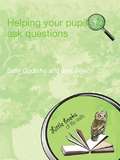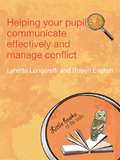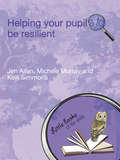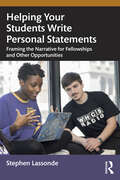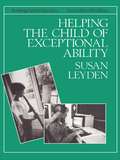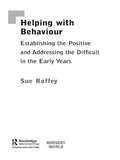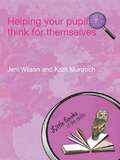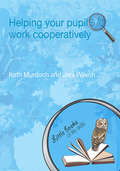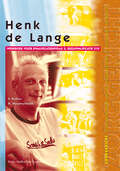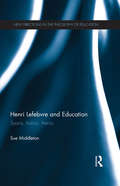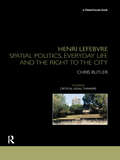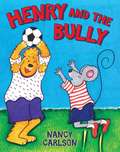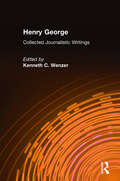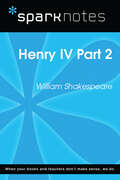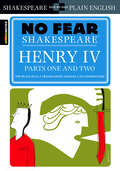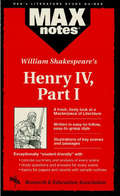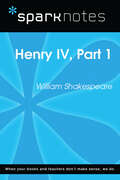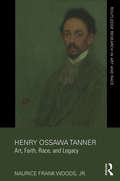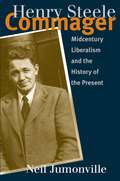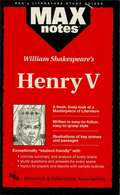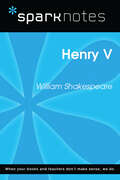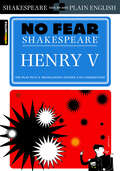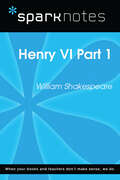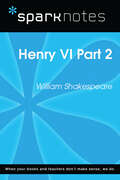- Table View
- List View
Helping Your Pupils to Ask Questions (Little Books Of Life Skills Ser.)
by Jeni Wilson Sally GodinhoWho? What? When? Where? Why? How? Asking questions has always been fundamental to making sense of the world. Unless we are able to critically question what we see, hear and read, we can‘t solve problems, create solutions, make informed decisions or enact change. And in our information-laden age, it is more important than ever to be able to decide w
Helping Your Pupils to Communicate Effectively and Manage Conflict (Little Books Of Life Skills Ser.)
by Lynette Longaretti Robyn EnglishWhy can't you just get along?' This is a question children are commonly asked. But they will usually have a very 'good' reason for their conflict � 'Because he's always telling me what to do!'; 'She stole my lunch!'. The fact is that any in social situation there is a potential for conflict. What children need are the skills to manage conflict when
Helping Your Pupils to be Resilient: Helping Your Pupils To Be Resilient (Little books of life skills)
by Jen Allen Michele Murray Kelli SimmonsFor many children, school life is hard. They may have a learning difficulty or problems at home. They may feel left out or have trouble making friends. Other children may be stealing from them or bullying them. However, the good news is that children can form a protective understanding of themselves that can help them withstand life’s adversities. When they are able to see and draw on their own beliefs, skills and support systems in a positive way, they develop self-esteem and an optimistic outlook – the foundations of resilience. Helping your pupils to be resilient clearly explains what reslience and self-esteem are and how they can foster a child’s emotional well-being. Focusing on the whole school environment, this book shows teachers how they can help develop resilience through support of their pupils’ understandings and the school’s prevention and intervention strategies. This book suggests ways to organise the classroom, provides teaching strategies and pupil activities and gives notes on assessment and record-keeping. It is complemented by several pages of proformas, which can be copied or amended for use in the classroom.
Helping Your Students Write Personal Statements: Framing the Narrative for Fellowships and Other Opportunities
by Stephen LassondeThis practical book is a timely and comprehensive guide designed for college advisors and instructors who are supporting and coaching students into successful internships, fellowships, graduate programs, and professional schools. This book emphasizes the most important part of any application, the personal statement: how to prepare to write it, how to draft it, how to revise it—and why to invest time in the process of developing it. Helping Your Students Write Personal Statements analyzes the components of the effective personal statement and provides examples from many successful essays by actual college students, as well as exercises for students. It also gives advisors the tools to help engage students who might not ordinarily consider themselves credible candidates for nationally competitive fellowships. This book uniquely takes a developmental approach, offering college advisors and teachers a concrete, step-by-step plan to help any student craft the best, most persuasive personal statement they can write, helping transform their students into compelling, competitive candidates.
Helping the Child with Exceptional Ability (Special Education Ser.)
by Susan LeydenFirst Published in 1985. Routledge is an imprint of Taylor & Francis, an informa company.
Helping with Behaviour: Establishing the Positive and Addressing the Difficult in the Early Years (Essential Guides for Early Years Practitioners)
by Sue RoffeyThis book shows how to establish good practice in early years settings so that all children are supported in developing positive interactions with one another. With limited material available for practitioners in this area, Sue Roffey explains the features of an 'emotionally literate' environment in order to meet the needs of more vulnerable children, and looks at how to respond effectively when children are distressed and hard to manage. She provides a wealth of ideas and inspiration throughout, using down-to-earth language, and looks at: how to foster language and build self-esteem how to help pre-schoolers learn to feel good about complying and co-operating how children can become strong individuals as well as learn to be good how to identify more worrying behaviour and when to refer to other professionals. Based on sound psychological theory and research and packed full of practical activities, illustrations, support and advice, this will be an invaluable source of inspiration for anyone concerned with providing the best environment for vulnerable young children in their care.
Helping your Pupils to Think for Themselves (Little Books Of Life Skills Ser.)
by Kath Murdoch Jeni WilsonPossibly the biggest challenge teachers face in the classroom is getting their pupils to think for themselves. When children learn to think independently, they are able to take control of their own learning. What�s more, they become good at dealing with the many problems that life will inevitably throw their way � not only good at solving these pro
Helping your Pupils to Work Cooperatively (Little Books Of Life Skills Ser.)
by Kath Murdoch Jeni WilsonThe classroom is one of the few places where pupils are regularly required to share, wait, take turns, compromise and work in pairs or groups. And when they are involved in the same project or task, not only are they expected to get along with others, but to get along well – well enough to communicate effectively and work together towards a shared goal or group product. It can be a challenging way to work for some pupils, but when it is done well, it can be very rewarding. When people are working together effectively, they are aware of each person’s roles and responsibilities, feel valued and respected, use a range of skills and strategies and understand the various processes and protocols required. And once the goal is reached, there is the opportunity to celebrate and share the accomplishment. Helping your pupils to work cooperatively clearly sets out the features of cooperative working and explains how it can enhance the many skills needed for effective social interaction, healthy relationships and active citizenship. Focusing on how the teacher’s role is critical to the success of cooperative working, this book shows teachers how they can develop a repertoire of strategies to help their pupils work cooperatively. Explicit instruction, modelling, feedback, intervention and strategic task selection are all described in detail and supported by examples. The book also suggests ways to organise the classroom, provides teaching strategies and pupil activities and gives notes on assessment and record-keeping. It is complemented by several pages of proformas, which can be copied or amended for use in the classroom.
Hemiplegie, deel 2 de romp centraal: de romp centraal
by H.P. Raadsen E. van DoornDit boek is het resultaat van meer dan vijf jaar ervaring met patiënten die het ongeluk hadden een hemiplegie te krijgen. Het bevat recente waarnemingen, nieuwe opvattingen over ontwikkelingen van behandelingstechnieken die kunnen leiden tot een beter inzicht in de problemen en een meer succesvolle revalidatie. De heldere foto's illustreren op instructieve wijze de behandelwijze van Pat Davies. Het boek is bestemd voor een ieder die betrokken is bij de revalidatie van hemiplegiepatiënten.
Henk de Lange
by Nicolien Van Halem D. E. Zwart S. Borkus R. Messerschmidt J. Sevenhuijsen J.H. van Meteren C.J.M. van der CingelZorgcategorie: verstandelijk gehandicaptenSetting: genormaliseerde woonvoorziening voor mensen met een verstandelijke handicapKorte inhoud: Henk de Lange woont in "De Klaver", een genormaliseerde woonvoorziening voor verstandelijk gehandicapten. Werken in zo'n woonvoorziening betekent dat je over verschillende competenties moet beschikken. Die variëren van huishoudelijke en verzorgende taken tot begeleiden en leidinggeven. Bij de oprichting van De Klaver dacht het team selfsupporting te kunnen zijn. Dat bleek, op basis van de groepssamenstelling, toch te hoog gegrepen. Nu maakt de groep gebruik van een aantal faciliteiten van de nabijgelegen zorginstelling. Toch blijft het voor het team een hele uitdaging om zo'n groot 'gezin' draaiende te houden. Van de verzorgende vraagt dit een planmatige en methodische aanpak, maar ook de nodige creativiteit.
Henri Lefebvre and Education: Space, history, theory (New Directions in the Philosophy of Education)
by Sue MiddletonDuring his lifetime Henri Lefebvre (1901-1991) was renowned in France as a philosopher, sociologist and activist. Although he published more than 70 books, few were available in English until The Production of Space was translated in 1991. While this work - often associated with geography - has influenced educational theory’s ‘spatial turn,’ educationalists have yet to consider Lefebvre’s work more broadly. This book engages in an educational reading of the selection of Lefebvre’s work that is available in English translation. After introducing Lefebvre’s life and works, the book experiments with his concepts and methods in a series of five ‘spatial histories’ of educational theories. In addition to The Production of Space, these studies develop themes from Lefebvre’s other translated works: Rhythmanalysis, The Explosion, the three volumes of Critique of Everyday Life and a range of his writings on cities, Marxism, technology and the bureaucratic state. In the course of these inquiries, Lefebvre’s own passionate interest in education is uncovered: his critiques of bureaucratised schooling and universities, the analytic concepts he devised to study educational phenomena, and his educational methods. Throughout the book Middleton demonstrates how Lefebvre’s conceptual and methodological tools can enhance the understanding of the spatiotemporal location of educational philosophy and theory. Bridging disciplinary divides, it will be key reading for researchers and academics studying the philosophy, sociology and history of education, as well as those working in fields beyond education including geography, history, cultural studies and sociology.
Henri Lefebvre: Spatial Politics, Everyday Life and the Right to the City (Nomikoi: Critical Legal Thinkers)
by Chris ButlerWhile certain aspects of Henri Lefebvre’s writings have been examined extensively within the disciplines of geography, social theory, urban planning and cultural studies, there has been no comprehensive consideration of his work within legal studies. Henri Lefebvre: Spatial Politics, Everyday Life and the Right to the City provides the first serious analysis of the relevance and importance of this significant thinker for the study of law and state power. Introducing Lefebvre to a legal audience, this book identifies the central themes that run through his work, including his unorthodox, humanist approach to Marxist theory, his sociological and methodological contributions to the study of everyday life and his theory of the production of space. These elements of Lefebvre’s thought are explored through detailed investigations of the relationships between law, legal form and processes of abstraction; the spatial dimensions of neoliberal configurations of state power; the political and aesthetic aspects of the administrative ordering of everyday life; and the ‘right to the city’ as the basis for asserting new forms of spatial citizenship. Chris Butler argues that Lefebvre’s theoretical categories suggest a way for critical legal scholars to conceptualise law and state power as continually shaped by political struggles over the inhabitance of space. This book is a vital resource for students and researchers in law, sociology, geography and politics, and all readers interested in the application of Lefebvre’s social theory to specific legal and political contexts.
Henry And The Bully
by Nancy CarlsonWhen a bully starts stealing Henry's soccer ball at recess, the little mouse doesn't know what to do. He tries to ask his teacher for help, and his mom, too. But soon Henry realizes he's got to find his own way to solve his bully problem.
Henry George: Collected Journalistic Writings
by Kenneth C. Wenzer Henry GeorgeMore than a century after his death in 1897, Henry George remains one of the most original and influential economic thinkers in American history. His revolutionary theory on land taxation gained a tremendous following, reshaped the nation's political and economic debate, and continues today to be a widely discussed and controversial subject throughout the world. George's seminal work was Progress and Poverty (1879), but as a reformer, economist, journalist, and political candidate he wrote scores of articles on a vast array of topics, including political thought, election reform, immigration, labor, Lincoln, presidential campaigns, private property, socialism, industrialization, Ireland, Australia, the Chinese in California, and his race for mayor of New York City. His writing shaped a generation of statesmen and intellectuals, including Winston Churchill, Robert La Follette, Clarence Darrow, George Bernard Shaw, and Milton Friedman. Despite his profound influence on economic thought and American reform, he remains understudied, in part because many of his writings appeared in obscure journals, long-defunct daily newspapers, and long out-of-print collections. This four-volume set rectifies this problem by gathering all of George's hard-to-find articles and essays in one comprehensive edition. It also includes the first biographical sketch of him, written in 1884 and never before republished, as well as numerous articles he wrote during his tour of Australia in 1890. Edited by noted George scholar Kenneth C. Wenzer, each article is reprinted in its original form with annotations. There is a general introduction to each volume. A timeline of George's activities and travels is also included.
Henry IV Part 2 (SparkNotes Literature Guide Series)
by SparkNotesHenry IV Part 2 (SparkNotes Literature Guide) by William Shakespeare Making the reading experience fun! Created by Harvard students for students everywhere, SparkNotes is a new breed of study guide: smarter, better, faster.Geared to what today's students need to know, SparkNotes provides:chapter-by-chapter analysis explanations of key themes, motifs, and symbols a review quiz and essay topics Lively and accessible, these guides are perfect for late-night studying and writing papers.
Henry IV Parts One and Two: No Fear Shakespeare Side-by-Side Plain English (No Fear Shakespeare)
by William Shakespeare SparkNotesThis No Fear Shakespeare ebook gives you the complete text of Henry IV Parts One and Twoand an easy-to-understand translation.Each No Fear Shakespeare containsThe complete text of the original playA line-by-line translation that puts Shakespeare into everyday languageA complete list of characters with descriptionsPlenty of helpful commentary
Henry IV, Part I (MAXNotes Literature Guides)
by Michael ModugnoREA's MAXnotes for William Shakespeare's Henry IV, Part I The MAXnotes offers a comprehensive summary and analysis of Henry IV, Part I and a biography of William Shakespeare. Places the events of the play in historical context and discusses each act in detail. Includes study questions and answers along with topics for papers and sample outlines.
Henry IV, Part I (SparkNotes Literature Guide Series)
by SparkNotesHenry IV, Part I (SparkNotes Literature Guide) by William Shakespeare Making the reading experience fun! Created by Harvard students for students everywhere, SparkNotes is a new breed of study guide: smarter, better, faster.Geared to what today's students need to know, SparkNotes provides:chapter-by-chapter analysis explanations of key themes, motifs, and symbols a review quiz and essay topics Lively and accessible, these guides are perfect for late-night studying and writing papers.
Henry Ossawa Tanner: Art, Faith, Race, and Legacy (Routledge Research in Art and Race)
by Naurice Frank Woods, Jr.Over the last forty years, renewed interest in the career of Henry Ossawa Tanner (1859–1937) has vaulted him into expanding scholarly discourse on American art. Consequently, he has emerged as the most studied and recognized representative of African American art during the nineteenth century. In fact, Tanner, in the spirit of political correctness and racial inclusiveness, has gained a prominent place in recent textbooks on mainstream American art and his painting, The Banjo Lesson (1893), has become an iconic symbol of black creativity. In addition, Tanner achieved national recognition when the Philadelphia Museum of Art in 1991 and the Pennsylvania Academy of the Fine Arts in 2012 celebrated him with major retrospectives. The latter exhibition brought in a record number of viewers. While Tanner lived a relatively simple life where his faith and family dictated many of the choices he made daily, his emergence as a prominent black artist in the late nineteenth century often thrust him openly into coping with the social complexities inherent with America’s great racial divide. In order to fully appreciate how he negotiated prevailing prejudices to find success, this book places him in the context of a uniquely talented black man experiencing the demands and rewards of nineteenth-century high art and culture. By careful examination on multiple levels previously not detailed, this book adds greatly to existing Tanner scholarship and provides readers with a more complete, richly deserved portrait of this preeminent American master.
Henry Steele Commager
by Neil JumonvilleHistorian Henry Steele Commager (1902-1998) was one of the leading American intellectuals of the mid-twentieth century. Author or editor of more than forty books, he taught for decades at New York University, Columbia University, and Amherst College and was a pioneer in the field of American studies. But Commager's work was by no means confined to the halls of the university: a popular essayist, lecturer, and political commentator, he earned a reputation as an activist for liberal causes and waged public campaigns against McCarthyism in the 1950s and the Vietnam War in the 1960s. As few have been able to do in the past half-century, Commager united the two worlds of scholarship and public intellectual activity. Through Commager's life and legacy, Neil Jumonville explores a number of questions central to the intellectual history of postwar America. After considering whether Commager and his associates were really the conservative and conformist group that critics have assumed them to be, Jumonville offers a reevaluation of the liberalism of the period. Finally, he uses Commager's example to ask whether intellectual life is truly compatible with scholarly life.
Henry V (MAXNotes Literature Guides)
by Nick PeaseREA's MAXnotes for William Shakespeare's Henry V The MAXnotes offers a comprehensive summary and analysis of Henry V and a biography of William Shakespeare. Places the events of the play in historical context and discusses each act in detail. Includes study questions and answers along with topics for papers and sample outlines.
Henry V (SparkNotes Literature Guide Series)
by SparkNotesHenry V (SparkNotes Literature Guide) by William Shakespeare Making the reading experience fun! Created by Harvard students for students everywhere, SparkNotes is a new breed of study guide: smarter, better, faster.Geared to what today's students need to know, SparkNotes provides:chapter-by-chapter analysis explanations of key themes, motifs, and symbols a review quiz and essay topics Lively and accessible, these guides are perfect for late-night studying and writing papers.
Henry V: No Fear Shakespeare Side-by-Side Plain English (No Fear Shakespeare)
by William Shakespeare SparkNotesThis No Fear Shakespeare ebook gives you the complete text of Henry Vand an easy-to-understand translation.Each No Fear Shakespeare containsThe complete text of the original playA line-by-line translation that puts Shakespeare into everyday languageA complete list of characters with descriptionsPlenty of helpful commentary
Henry VI Part 1 (SparkNotes Literature Guide Series)
by SparkNotesHenry VI Part 1 (SparkNotes Literature Guide) by William Shakespeare Making the reading experience fun! Created by Harvard students for students everywhere, SparkNotes is a new breed of study guide: smarter, better, faster.Geared to what today's students need to know, SparkNotes provides:*chapter-by-chapter analysis *explanations of key themes, motifs, and symbols *a review quiz and essay topics Lively and accessible, these guides are perfect for late-night studying and writing papers.
Henry VI Part 2 (SparkNotes Literature Guide Series)
by SparkNotesHenry VI Part 2 (SparkNotes Literature Guide) by William Shakespeare Making the reading experience fun! Created by Harvard students for students everywhere, SparkNotes is a new breed of study guide: smarter, better, faster.Geared to what today's students need to know, SparkNotes provides:chapter-by-chapter analysis explanations of key themes, motifs, and symbols a review quiz and essay topics Lively and accessible, these guides are perfect for late-night studying and writing papers.
